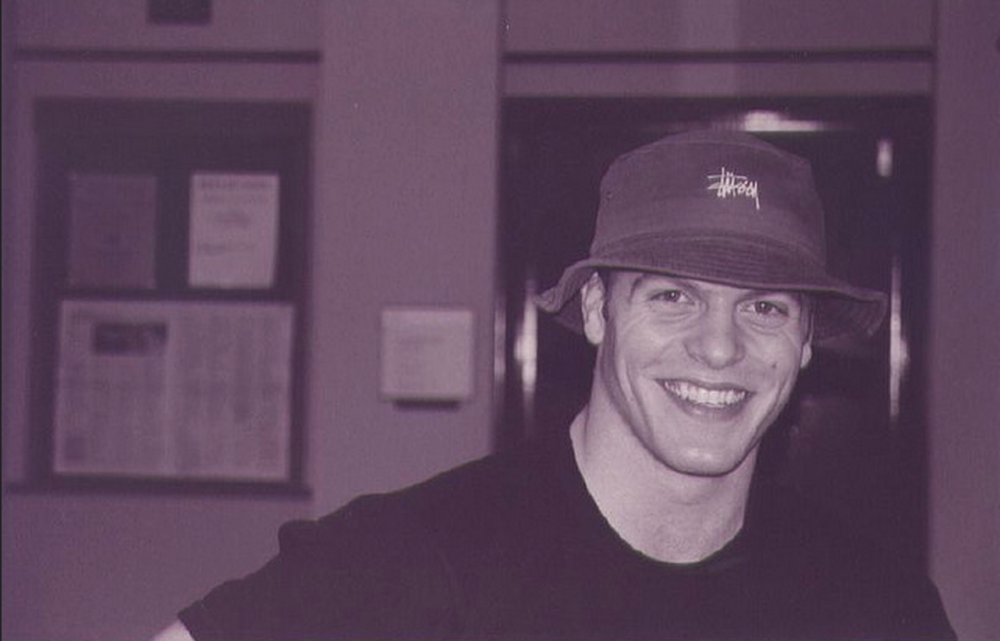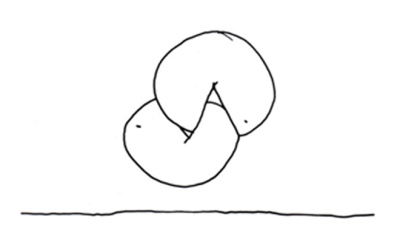
Practical Thoughts on Suicide

This happy-looking shot was taken in 1999, when I almost destroyed myself.
In this post, I’m going to talk about suicide, and why I’m still on this planet.
These are stories I’ve kept secret from my family, girlfriends, and closest friends for years. Recently, however, I had an experience that shook me — woke me up — and I decided that it was time to share it all.
So, despite the shame I might feel, the fear that is making my palms sweat as I type this, allow me to get started.
Here we go…
A TWIST OF FATE
“Could you please sign this for my brother? It would mean a lot to him.”
He was a kind fan. There were perhaps a dozen people around me asking questions, and he had politely waited his turn. The ask: A simple signature.
It was Friday night, around 7pm, and a live recording of the TWiST podcast had just ended. There was electricity in the air. Jason Calacanis, the host and interviewer, sure knows how to put on a show. He’d hyped up the crowd and kept things rolling for more than 2 hours on stage, asking me every imaginable question. The venue–Pivotal Labs’ offices in downtown SF–had been packed to capacity. Now, more than 200 people were milling about, drinking wine, or heading off for their weekends.
A handful of attendees gathered near the mics for pics and book inscriptions.
“Anything in particular you’d like me to say to him? To your brother?” I asked this one gent, who was immaculately dressed in a suit. His name was Silas.
He froze for few seconds but kept eye contact. I saw his eyes flutter. There was something unusual that I couldn’t put a finger on.
I decided to take the pressure off: “I’m sure I can come up with something. Are you cool with that?” Silas nodded.
I wrote a few lines, added a smiley face, signed the book he’d brought, and handed it back. He thanked me and backed out of the crowd. I waived and returned to chatting with the others.
Roughly 30 minutes later, I had to run. My girlfriend had just landed at SFO and I needed to meet her for dinner. I started walking towards the elevators.
“Excuse me, Tim?” It was Silas. He’d been waiting for me. “Can I talk to you for a second?”
“Sure,” I said, “but walk with me.”
We meandered around tables and desks to the relative privacy of the elevator vestibule, and I hit the Down button. As soon as Silas started his story, I forgot about the elevator.
He apologized for freezing earlier, for not having an answer. His younger brother–the one I signed the book for–had recently committed suicide. He was 22.
“He looked up to you,” Silas explained, “He loved listening to you and Joe Rogan. I wanted to get your signature for him. I’m going to put this in his room.” He gestured to the book. I could see tears welling up in his eyes, and I felt my own doing the same. He continued.
“People listen to you. Have you ever thought about talking about these things? About suicide or depression? You might be able to save someone.” Now, it was my turn to stare at him blankly. I didn’t know what to say.
I also didn’t have an excuse. Unbeknownst to him, I had every reason to talk about suicide. I’d only skimmed the surface with a few short posts about depression.
Some of my closest high school friends killed themselves.
Some of my closest college friends killed themselves.
I almost killed myself.
“I’m so sorry for your loss,” I said to Silas. I wondered if he’d waited more than three hours just to tell me this. I suspected he had. Good for him. He had bigger balls than I. Certainly, I’d failed his brother by being such a coward in my writing. How many othershad I failed? These questions swam in my mind.
“I will write about this” I said to Silas, awkwardly patting his shoulder. I was thrown off. “I promise.”
And with that, I got into the elevator.
INTO THE DARKNESS
“They tried to bury us. They didn’t know we were seeds.”
– Mexican proverb
There are some secrets we don’t share because they’re embarrassing.
Like that time I met an icon by accidentally hitting on his girlfriend at a coffee shop? That’s a good one (Sorry, N!). Or the time a celebrity panelist borrowed my laptop to project a boring corporate video, and a flicker of porn popped up–a la Fight Club–in front of a crowd of 400 people? Another good example.
But then there are dark secrets. The things we tell no one. The shadows we keep covered for fear of unraveling our lives.
For me, 1999 was full of shadows.
So much so that I never wanted to revisit them.
I hadn’t talked about this traumatic period publicly until last week, first in a reddit AMA (Ask Me Anything), then in greater depth on Derek Halpern’s podcast.
What follows is the sequence of my downward spiral.
Reading the below, it’s incredible how trivial some of it seems in retrospect. At the time, though, it was the perfect storm.
I include wording like “impossible situation,” which was reflective of my thinking at the time, not objective reality.
I still vividly recall these events, but any quotes are paraphrased. Please also excuse any grammatical/tense errors, as it was hard for me to put this down. So, starting where it began…
- It’s my senior year at Princeton. I’m slated to graduate around June of 1999. Somewhere in the first six months, several things happen in the span of a few weeks:
- I fail to make it to final interviews for McKinsey Consulting and Trilogy Software, in addition to others. I have no idea what I’m doing wrong, and I start losing confidence after “winning” in the game of academics for so long.
- A long-term (for a college kid, anyway) girlfriend breaks up with me shortly thereafter. Not because of the job stuff, but because I became more insecure during that period, wanted more time with her, and was massively disruptive to her final varsity sports season. What’s wrong with me?
- I have a fateful meeting with one of my thesis advisors in the East Asian Studies department. Having read a partial draft of my work, he presents a large stack of original research in Japanese for me to incorporate. I walk out with my head spinning — how am I going to finish this thesis (which generally run 60-100 pages or more) before graduation? What am I going to do?
It’s important to note that at Princeton, the senior thesis is largely viewed as the pinnacle of your four-year undergrad career. That’s reflected in its grading. The thesis is often worth around 25% of your entire departmental GPA (English department example here).
After all of the above, things continued as follows…
- I find a rescue option! In the course of researching language learning for the thesis, I’m introduced to a wonderful PhD who works at Berlitz International. Bernie was his name. We have a late dinner one night on Witherspoon Street in Princeton. He speaks multiple languages and is a nerd, just like me. One hour turns into two, which turns into three. At the end, he says, “You know, it’s too bad you’re graduating in a few months. I have a project that would be perfect for you, but it’s starting sooner.” This could be exactly the solution I’m looking for!
- I chat with my parents about potentially taking a year off, beginning in the middle of my senior year. This would allow me time to finish a world-class thesis, while simultaneously testing jobs in the “real world.” It seems like a huge win-win, and my parents— to their credit —are hugely supportive.
- The Princeton powers OK the idea, and I meet with the aforementioned thesis advisor to inform him of my decision. Instead of being happy that I’m taking time to get the thesis right (what I expected), he seems furious: “So you’re just going to quit?! To cop out?! This better be the best thesis I’ve ever seen in my life.” In my stressed out state, and in the exchange that follows, I hear a series of thinly veiled threats and ultimatums… but no professor would actually do that, right? The meeting ends with a dismissive laugh and a curt “Good luck.” I’m crushed and wander out in a daze.
- Once I’ve regained my composure, my shock turns to anger. How could a thesis advisor threaten a student with a bad grade just because they’re taking time off? I knew my thesis wouldn’t be “the best thesis” he’d ever seen, so it was practically a guarantee of a bad grade, even if I did a great job. This would be obvious to anyone, right?
- I meet with multiple people in the Princeton administration, and the response is — simply put — “He wouldn’t do that.” I’m speechless. Am I being called a liar? Why would I lie? What was my incentive? It seemed like no one was willing to rock the boat with a senior (I think tenured) professor. I’m speechless and feel betrayed. Faculty politics matter more than I do.
- I leave my friends behind at school and move off campus to work — I find out remotely — for Berlitz. “Remote” means I end up working at home by myself. This is a recipe for disaster. The work is rewarding, but I spend all of my non-work time — from when I wake to when I go to bed — looking at hundreds of pages of thesis notes and research spread out on my bedroom floor. It’s an uncontainable mess.
- After 2-3 months of attempting to incorporate my advisor’s original-language Japanese research, the thesis is a disaster. Despite (or perhaps because of) staring at paper alone for 8-16 hours a day, it’s a Frankenstein’s monster of false starts, dead ends, and research that shouldn’t be there in the first place. Totally unusable. I am, without a doubt, in worse shape than when I left school.
- My friends are graduating, celebrating, and leaving Princeton behind. I am sitting in a condo off campus, trapped in an impossible situation. My thesis work is going nowhere, and even if it turns out spectacular, I have (in my mind) a vindictive advisor who’s going to burn me. By burning me, he’ll destroy everything I’ve sacrificed for since high school: great grades in high school got me to Princeton, great grades in Princeton should get me to a dream job, etc. By burning me, he’ll make Princeton’s astronomical tuition wasted money, nothing more than a small fortune my family has pissed away. I start sleeping in until 2 or 3pm. I can’t face the piles of unfinished work surrounding me. My coping mechanism is to cover myself in sheets, minimize time awake, and hope for a miracle.
- No miracle arrives. Then one afternoon, as I’m wandering through a Barnes and Noble with no goal in particular, I chance upon a book about suicide. Right there in front of me on a display table. Perhaps this is the “miracle”? I sit down and read the entire book, taking copious notes into a journal, including other books listed in the bibliography. For the first time in ages, I’m excited about research. In a sea of uncertainty and hopeless situations, I feel like I’ve found hope: the final solution.
- I return to Princeton campus. This time, I go straight to Firestone Library to check out all of the suicide-related books on my to-do list. One particularly promising-sounding title is out, so I reserve it. I’ll be next in line when it comes back. I wonder what poor bastard is reading it, and if they’ll be able to return it.
- It’s important to mention here that, by this point, I was past deciding. The decision was obvious to me. I’d somehow failed, painted myself into this ridiculous corner, wasted a fortune on a school that didn’t care about me, and what would be the point of doing otherwise? To repeat these types of mistakes forever? To be a hopeless burden to myself and my family and friends? Fuck that. The world was better off without a loser who couldn’t figure this basic shit out. What would I ever contribute? Nothing. So the decision was made, and I was in full-on planning mode.
- In this case, I was dangerously good at planning. I had 4-6 scenarios all spec’d out, start to finish, including collaborators and covers when needed. And that’s when I got the phone call.
- I’d forgotten that Firestone Library now had my family home address on file, as I’d technically taken a year of absence. This meant a note was mailed to my parents, something along the lines of “Good news! The suicide book you requested is now available at the library for pick up!”
- Oops (and thank fucking God).
- Suddenly caught on the phone with my mom, I was unprepared. She nervously asked about the book, so I thought fast and lied: “Oh, no need to worry about that. Sorry! One of my friends goes to Rutgers and didn’t have access to Firestone, so I reserved it for him. He’s writing about depression and stuff.”
- I was shocked out of my own delusion by a one-in-a-million accident. It was only then that I realized something: my death wasn’t just about me. It would completely destroy the lives of those I cared most about. I imagined my mom, who had no part in creating my thesis mess, suffering until her dying day, blaming herself.
- The very next week, I decided to take the rest of my “year off” truly off (to hell with the thesis) and focus on physical and mental health. That’s how the entire “sumo” story of the 1999 Chinese Kickboxing (Sanshou) Championships came to be, if you’ve read The 4-Hour Workweek.
- Months later, after focusing on my body instead of being trapped in my head, things were much clearer. Everything seemed more manageable. The “hopeless” situation seemed like shitty luck but nothing permanent.
- I returned to Princeton, turned in my now-finished thesis to my still-sour advisor, got chewed up in my thesis defense, and didn’t give a fuck. It wasn’t the best thesis he’d ever read, nor the best thing I’d ever written, but I had moved on.
- Many thanks are due to a few people who helped me regain my confidence that final semester. None of them have heard this story, but I’d like to give them credit here. Among others: My parents and family (of course), Professor Ed Zschau (Entrepreneurship), John McPhee (Non-Fiction Writing–the irony!), Sympoh dance troupe, and my friends at the amazing Terrace Food Club.
- I graduated with the class of 2000, and bid goodbye to Nassau Hall. I rarely go back, unless it’s to help one of the people mentioned above.
Given the purported jump in “suicidal gestures” at Princeton and its close cousins (Harvard appears to have 2x the national average for undergrad suicides), I hope the administration is taking things seriously. If nearly half of your student population reports feeling depressed, there might be systemic issues to fix.
Left unfixed, you’ll have more dead kids on your hands, guaranteed.
It’s not enough to wait for people to reach out, or to request at-risk kids take a leave of absence “off the clock” of the university.
Perhaps reach out to the entire student body regularly to catch people before they fall? It could be as simple as email.
OUT OF THE DARKNESS
“Being deeply loved by someone gives you strength, while loving someone deeply gives you courage…”
– Lao Tzu
First, let me give a retrospective analysis of my near obliteration. Then, I’ll give you a bunch of tools and tricks that I still use for keeping the darkness at arm’s length.
Now, at this point, some of you might also be thinking “That’s it?! A Princeton student was at risk of getting a bad grade? Boo-fuckin’-hoo, man. Give me a break…”
But… that’s the entire point. It’s easy to blow things out of proportion, to get lost in the story you tell yourself, and to think that your entire life hinges on one thing you’ll barely remember 5-10 years later. That seemingly all-important thing could be a bad grade, getting into college, a relationship, a divorce, getting fired, or just a bunch of hecklers on the Internet.
So, back to our story–why didn’t I kill myself?
Below are the realizations that helped me (and a few friends). They certainly won’t work for everyone suffering from depression, but my hope is that they help some of you.
1. Call this number : 1 (800) 273-8255. I didn’t have it, and I wish I had. It’s the National Suicide Prevention Lifeline (website and live chat here). It’s available 24 hours a day, 7 days a week, in both English and Spanish.
If you’re outside of the US, please click here for a list of international hotlines.
Sometimes, it just takes one conversation with one rational person to stop a horrible irrational decision. If you’re considering ending your life, please reach out to them. If you’re too embarrassed to admit that, as I was, then you can ping them “just to chat for a few minutes.” Pretend you’re killing time or testing different suicide hotlines for a directory you’re compiling. Whatever works.
Speaking personally, I want to see the gifts you have to offer the world. And speaking from personal experience, believe me: this too shall pass, whatever it is.
2. I realized it would destroy other people’s lives. Killing yourself can spiritually kill other people.
Even if you’re not lucky enough, as I was, to feel loved by other people, I think this is worth meditating on.
Your death is not perfectly isolated. It can destroy a lot, whether your family (who will blame themselves), other loved ones, or simply the law enforcement officers or coroners who have to haul your death mask-wearing carcass out of an apartment or the woods. The guaranteed outcome of suicide is NOT things improving for you (or going blank), but creating a catastrophe for others. Even if your intention is to get revenge through suicide, the damage won’t be limited to your targets.
A friend once told me that killing yourself is like taking your pain, multiplying it 10x, and giving it to the ones who love you. I agree with this, but there’s more. Beyond any loved ones, you could include neighbors, innocent bystanders exposed to your death, and people — often kids — who commit “copycat suicides” when they read about your demise. This is the reality, not the cure-all fantasy, of suicide.
If think about killing yourself, imagine yourself wearing a suicide bomber’s vest of explosives and walking into a crowd of innocents.
That’s effectively what it is. Even if you “feel” like no one loves you or cares about you, you are most likely loved–and most definitely lovable and worthy of love.
3. There’s no guarantee that killing yourself improves things!
In a tragically comic way, this was a depressing realization when I was considering blowing my head off or getting run over. Damnation! No guarantees. Death and taxes, yes, but not a breezy afterlife.
The “afterlife” could be 1,000x worse than life, even at its worst. No one knows. I personally believe that consciousness persists after physical death, and it dawned on me that I literally had zero evidence that my death would improve things. It’s a terrible bet. At least here, in this life, we have known variables we can tweak and change. The unknown void could be Dante’s Inferno or far worse. When we just “want the pain to stop,” it’s easy to forget this. You simply don’t know what’s behind door #3.
In our desperation, we often just don’t think it through. It’s kind of like the murder-suicide joke by one of my favorite comics, Demetri Martin:
“Someone who commits a murder-suicide is probably somebody who isn’t thinking through the afterlife. Bam! You’re dead. Bam! I’m dead. Oh shit … this is going to be awkward forever.”
4. Tips from friends, related to #2 above.
For some of my friends (all high achievers, for those wondering), a “non-suicide vow” is what made all the difference. Here is one friend’s description:
“It only mattered when I made a vow to the one person in my life I knew I would never break it to . It’s powerful when you do that. All of a sudden, this option that I sometimes played around in my mind, it was off the table. I would never break a vow to my brother, ever. After the vow and him accepting it, I’ve had to approach life in a different way. There is no fantasy escape hatch. I’m in it. In the end, making a vow to him is the greatest gift I could have given myself.”
As silly as it might sound, it’s sometimes easier to focus on keeping your word, and avoiding hurting someone, than preserving your own life.
And that’s OK. Use what works first, and you can fix the rest later. If you need to disguise a vow out of embarrassment (“How would I confess that to a friend?!”), find a struggling friend to make a mutual “non-suicide vow” with. Make it seem like you’re only trying to protect him or her. Still too much? Make it a “mutual non-self-hurt” vow with a friend who beats themselves up.
Make it about him or her as much as you.
If you don’t care about yourself, make it about other people.
Make a promise you can’t break, or at the very least realize this: killing yourself will destroy other people’s lives.
PRACTICAL GREMLIN DEFENSE
Now, let’s talk day-to-day tactics.
The fact of the matter is this: if you’re driven, an entrepreneur, a type-A personality, or a hundred other things, mood swings are part of your genetic hardwiring. It’s a blessing and a curse.
Below are a number of habits and routines that help me. They might seem simplistic, but they keep me from careening too far off the tracks. They are my defense against the abyss. They might help you find your own, or use them as a starting point.
Most of this boxed text is from a previous post on “productivity ‘hacks’ for the neurotic, manic-depressive, and crazy (like me)“, but I’ve added a few things:
Most “superheroes” are nothing of the sort. They’re weird, neurotic creatures who do big things DESPITE lots of self-defeating habits and self-talk.
Here are some of my coping mechanisms for making it through the day:
1) Wake up at least 1 hour before you have to be at a computer screen. E-mail is the mind killer.
2) Make a cup of tea (I like pu-erh like this) and sit down with a pen/pencil and paper.
3) Write down the 3-5 things — and no more — that are making you most anxious or uncomfortable. They’re often things that have been punted from one day’s to-do list to the next, to the next, to the next, and so on. Most important usually = most uncomfortable, with some chance of rejection or conflict.
4) For each item, ask yourself:
– “If this were the only thing I accomplished today, would I be satisfied with my day?”
– “Will moving this forward make all the other to-do’s unimportant or easier to knock off later?”5) Look only at the items you’ve answered “yes” to for at least one of these questions.
6) Block out at 2-3 hours to focus on ONE of them for today. Let the rest of the urgent but less important stuff slide. It will still be there tomorrow.
7) TO BE CLEAR: Block out at 2-3 HOURS to focus on ONE of them for today. This is ONE BLOCK OF TIME. Cobbling together 10 minutes here and there to add up to 120 minutes does not work.
8) If you get distracted or start procrastinating, don’t freak out and downward spiral; just gently come back to your ONE to-do.
9) Physically MOVE for at least 20 minutes each day. Go for a long walk, lift weights, take a free online yoga class (YouTube), anything. Ideally, get outside. I was once asked by friend for advice on overcoming debilitating stress. The answer I repeated over and over again was: “Remember to EXERCISE daily. That is 80% of the battle.”
10) Follow a diet that prevents wild blood sugar swings. This means avoiding grains and refined carbohydrates most of the time. I follow the slow-carb diet with one cheat day per week and have done so for 10+ years. Paleo also works great. Don’t forget to eat plenty of fat. High protein and low fat can give you low-grade symptoms of rabbit starvation.
11) Schedule at least one group dinner with friends per week. Get it on the calendar no later than 5pm on Monday. Ideal to have at least three people, but two is still great medicine.
12) Take a minute each day to call or email someone to express gratitude of some type. Consider someone you haven’t spoken with in a long time. It can be a one-line text or a 5-second voicemail.
Congratulations! That’s it.
Those are the rules I use, and they help steer the ship in the right direction.
Routines are the only way I can feel “successful” despite my never-ending impulse to procrastinate, hit snooze, nap, and otherwise fritter away my days with bullshit. If I have 10 “important” things to do in a day, I’ll feel overwhelmed, and it’s 100% certain nothing important will get done that day. On the other hand, I can usually handle 1 must-do item and block out my lesser behaviors for 2-3 hours a day.
And when — despite your best efforts — you feel like you’re losing at the game of life, never forget: Even the best of the best feel this way sometimes. When I’m in the pit of despair with new book projects, I recall what iconic writer Kurt Vonnegut said about his process: “When I write, I feel like an armless, legless man with a crayon in his mouth.”
Don’t overestimate the world and underestimate yourself. You are better than you think.
TO WRAP UP THIS LONG-ASS POST
My “perfect storm” was nothing permanent.
If we let the storms pass and choose to reflect, we come out better than ever. In the end, regardless of the fucked up acts of others, we have to reach within ourselves and grow. It’s our responsibility to ourselves and–just as critical–to those who love and surround us.
You have gifts to share with the world.
You are not alone.
You are not flawed.
You are human.
And when the darkness comes, when you are fighting the demons, just remember: I’m right there fighting with you.
The gems I’ve found were forged in the struggle. Never ever give up.
Much love,
Tim
P.S. If you have tips that have helped you overcome or manage depression, please share in the comments. I would love for this post to become a growing resource for people. I will also do my best to improve it over time. Thank you.
First published at fourhourworkweek.com.







